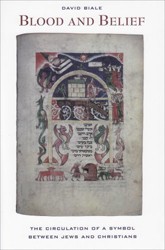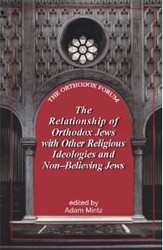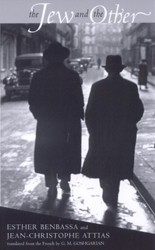Based on their 1994 original work in Hebrew, Professors Sagi and Zohar have rendered an important service to those who would understand the process of conversion. It is not a handbook of procedures; nor is it, strictly speaking, a history of conversion. More significantly, this vast array and compilation of original sources seeks to understand the very nature and essence of conversion. Which factors are determinative of one’s newly acquired Jewishness? Do the rabbis subjectively evaluate conversion candidates or is an objective measurement applied? What qualities must a candidate for conversion present? What leeway do rabbis have in accepting converts?
In an ideal world all converts to Judaism would embrace Jewish observance in its totality. In fact, this is what is encouraged by those who conduct conversions. However, since we do not always live in an ideal Torah oriented society, the Rabbis from the time of the Mishna until today have dealt with the issue of converts who are non-observant, converts who change their mind after the fact, and those who convert for reasons other than a pure desire to be Jewish.
What is most fascinating to the uninitiated is the Talmudic formula for conversion, which is codified in every Jewish legal canon. In brief, if someone wants to become Jewish and share the slings and arrows of Jewish misfortune as well as their ultimate destiny, he/she is asked why. If they willingly accept their fate and kinship as part of the Jewish community as well as the commandments, they are accepted immediately, circumcised (males) and immersed (men and women) in a ritual pool (mikvah) and are considered Jewish! They are informed of major and minor commandments, but are not to be harassed about them. If they revert or do not observe, they are still Jews, sinners, but still Jewish.
There is no statutory waiting period or learning curve. There is no requirement to read Hebrew, nor even a delineation of which commandments they are informed about, i.e. not mandated to observe as a prerequisite. The tribunal needs only to be convinced of a convert’s sincerity and earnestness. There is a recognition that Jewish observance is too vast to be mastered ab initio. Granted that there are theoretical standards to be implemented, but the sources deal with the occasions when there is less than ideal adherence to Jewish observance.
The authors make a convincing case that what is sought by the rabbis is a person’s desire to share Jewish destiny. Further, they show that the rituals of conversion, circumcision, and immersion in a mikvah, are determinative of a convert’s Jewish status.
It must be stated that these leniencies are all ex post facto. But, what this study does show is that the Rabbis were realists and quite practical. There are some sources which are decidedly strict and rigidly opposed to any leniency. However, the preponderance of materials presented and the manner in which they are interpreted indicate that historically the Rabbis leaned towards leniency and compassion in these matters.
The importance of the volume is its currency, since this very debate is being played out in Israel today. The haredi rabbis who control the conversion courts are not only very demanding of potential converts, but are attempting to retroactively annul certain conversions done over the past fifteen years. Both of these positions seem contrary to the Halakha. In addition, American Orthodox conversions are being scrutinized and are not automatically accepted anymore in Israel.
Transforming Identity should be required reading for all rabbinical students. Certain rabbis should read it as well.





